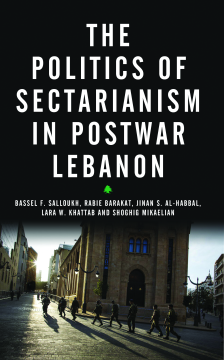
BOOK
The Politics of Sectarianism in Postwar Lebanon
Bassel F Salloukh | Rabie Barakat | Jinan S Al-Habbal | Lara. W Khattab | Shoghig Mikaelian
(2015)
Additional Information
Book Details
Abstract
The wave of popular uprisings that swept across the Arab world starting in December 2010 rattled regimes from Morocco to Oman. However, Lebanon's sectarian system proved immune to the domestic and regional pressures unleashed by the Arab Spring. How can this be explained? How has the country's political elite dealt with challenges to the system? And, finally, what lessons can other Arab states draw from Lebanon's sectarian experience?
This book looks at the mix of institutional, clientelist, and discursive practices that sustain the sectarian nature of Lebanon. It exposes snapshots of an ever-expanding sectarian web that occupies substantial areas of everyday life and surveys struggles waged by opponents of the system - by women, teachers, public sector employees, students or coalitions across NGOs - and how their efforts are often sabotaged or contained by numerous systematic forces.
'Well-researched and theoretically rigourous ... highly recommended'
Choice
'A must read for anyone interested in what is going on in Lebanon and the Middle East today'
James Tully, Distinguished Professor Emeritus of Political Science, Law, Indigenous Governance and Philosophy at the University of Victoria, Canada.
'An important contribution to the study of identity politics in the Middle East. Offers a far more compelling treatment than many journalistic accounts'
Melani Cammett, Professor of Government, Harvard University
'The authors of this exceptional volume have added immeasurably to our understanding of the role of sectarian identities in all spheres of Lebanese life'
Steven Heydemann, Vice President, Applied Research on Conflict, United States Institute of Peace
'Well-researched and theoretically rigorous ... Highly recommended'
CHOICE
A judicious and well-argued case for why sectarianism continues to dominate the Lebanese political system, even though there is nothing inevitable about that result'
F. Gregory Gause, III, John H. Lindsey ’44 Chair, Professor of International Affairs and Head of the International Affairs Department at the Bush School of Government and Public Service, Texas A&M University
'A rigorous, timely examination of the reproduction of sectarianism'
Open Democracy
'A very thoughtful account of sectarianism. The authors' theoretically rich post-culturalist lens offers considerable insight into the role played by institutions, discourse, clientalism, economic power, political mobilisation and regional context'
Rex Brynen, Professor of Political Science, McGill University
Table of Contents
| Section Title | Page | Action | Price |
|---|---|---|---|
| Cover | Cover | ||
| Contents | vii | ||
| Preface | viii | ||
| 1. Introduction | 1 | ||
| 2. A Political History of Sectarian Institutions | 12 | ||
| 3. Institutions, Sectarian Populism, and the Production of Docile Subjects | 32 | ||
| 4. Neoliberal Sectarianism and Associational Life | 52 | ||
| 5. Sectarianism and Struggles for Socio-Economic Rights | 70 | ||
| 6. Elections, Electoral Laws, and Sectarianism | 88 | ||
| 7. Between Sectarianism and Military Development: The Paradox of the Lebanese Armed Forces | 108 | ||
| 8. The Postwar Mediascape and Sectarian Demonizing | 136 | ||
| 9. Overlapping Domestic/Geopolitical Contests, Hizbullah, and Sectarianism | 155 | ||
| Conclusion | 174 | ||
| Notes | 184 | ||
| Index | 220 |
